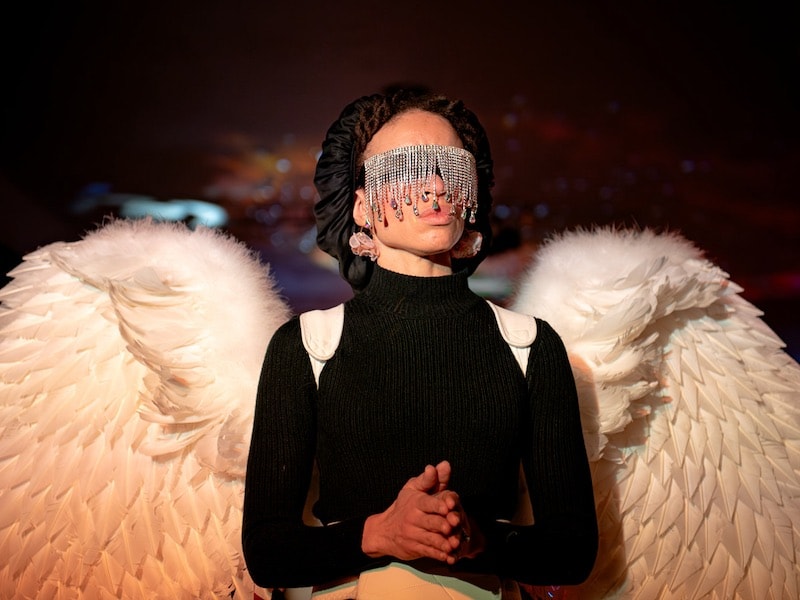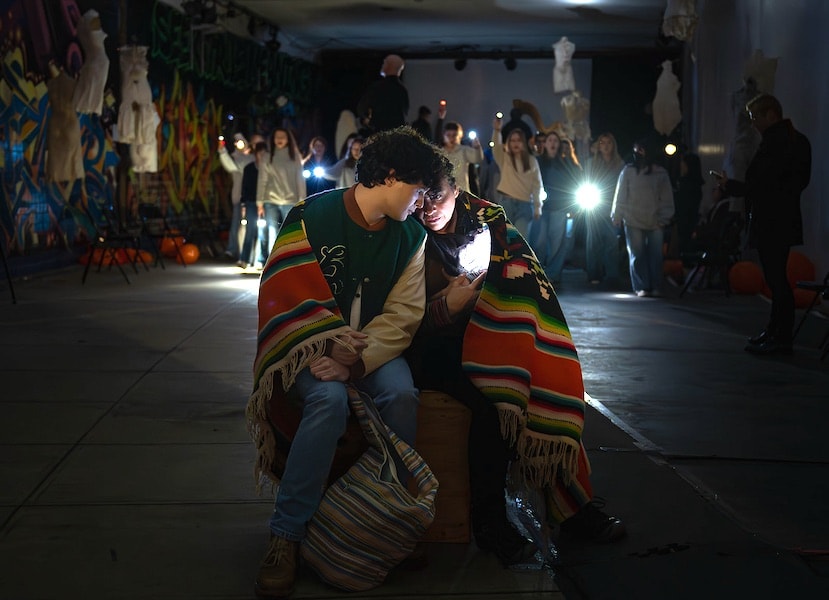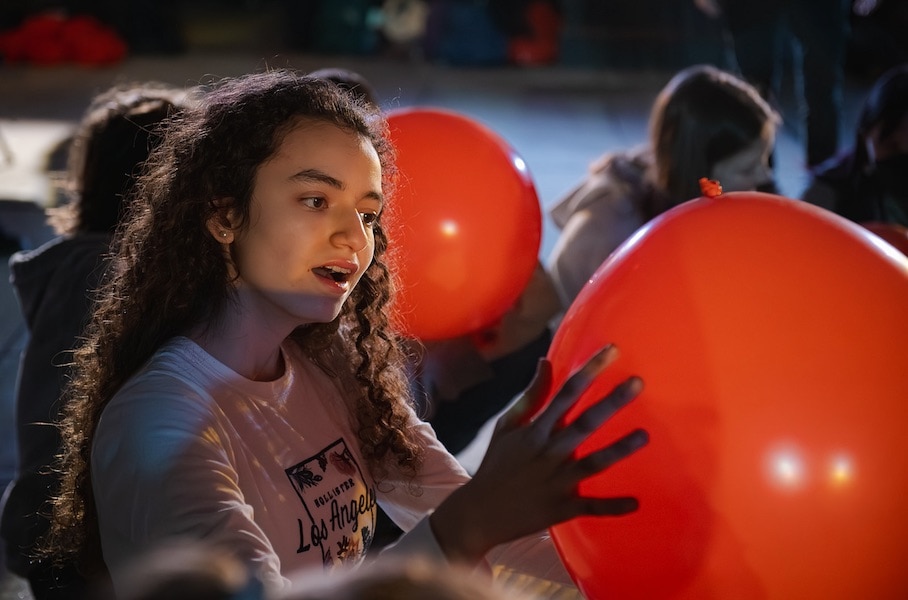IN Series’ immersive multisensory experience Las Místicas de México is a damn good show.
There are moments watching it when you are struck by how adroitly the staging ranges from the profound to the sumptuous to the playful. Throughout it is marvelously well sung with thrilling authenticity and performed with unequivocal commitment by an intergenerational cast (much respect to Children’s Chorus of Washington).
Las Místicas de México translates as The (woman) Mystics of Mexico. The music drama highlights the manifestation of spirit (which is clearly nonbinary) in and through the female body/mind. And despite the story’s chilling portrait of intransigent cruelty toward children and women, there are balloons at the end.

Aiming to be more than mere entertainment, Las Místicas plays like a ritualized prophetic call to reckoning for human beings of any time period and pointedly for the present day in the Americas. The piece comes by this status honestly. In his program note, IN Series Artistic Director Tim Nelson describes Las Místicas as a contemporary version of the European Mystery Plays and Passion Plays, “community pieces of theater, collective acts of re-presenting sacred tales that mixed profane and profound in something that was immersive and participatory…that invites the reading of contemporary public conversation and the personal sacred experience through the lens of something ancient and obscure.”
The musical spine of Las Místicas de México comes from a 12th-century chant on the story of “The Massacre of the Innocents.” King Herod, having heard that a child would be born who would take over his throne, decides to kill all children under two years old. Around this chant are set works from mystical creative female voices from Mexico. Included are the words and music of Sor Juana Ines de la Cruz, Gloria Anzaldúa, Toña La Negra, Maria Grever, Chavela Vargas Teresa Lara, and Frida Kahlo.
The production was staged March 9 and 10 in the Dupont Underground (echoing the ancient, clandestine religious/cult gatherings). This long tunnel was punctuated by the stylized translucent sculptures of women’s torsos (created by Marta Pérez Garcia) hanging from the ceiling. (The piece will be performed again in DC on March 15 and 16 and in Baltimore on March 23 and 24.)

There were, intentionally, fewer chairs than there were audience members. Many of us stood on opposite sides of the tunnel. There were piles of large orange pom-poms here and there. (Are these marigolds — the flowers used to honor the deceased on the Mexican Day of the Dead and that attract souls of the dead to the offerings on the altar? Is the place where we are standing, in fact, an altar?) The song “Oracion Caribe” is played and a phalanx of middle school-aged children wearing backpacks troops into the space amid the audience. An authoritative narrator speaks:
This has already been written. I say “Herod,” but I could also say “Jefe,” “Capo,” “Presidente,” this child is your enemy.
Throughout the space, children collapse to the floor and rise again repeatedly. And we hear them say:
Why have you abandoned us? Have we no place in our homeland? America, America, why have you abandoned us? America, America, this is the name of our sorrow, this is the sound of all our loss, all our love. Why have you abandoned us? They will come to take us now.
And then the floor is covered with children, strewn all around us.
There is much more that happens over the course of the oratorio-like portrait of the state of the world we are in. Angels and Comforters appear. The children wander through the space with flashlights and illuminate the insides and outsides of the hanging sculpted torsos of women. Culturally foundational songs of longing, encouragement, and cultural remembrance are sung. At one point someone says:
“Let us use our external and internal conflicts and wounds to enter the soul.” Rachel, the Old Testament biblical matriarch invites us: “Come, mothers like me. Come, enrage your pain. Find with me our unreturning children.”
At the work’s conclusion, we see the children assembled, sitting in a circle, like a campfire, at the lower end of our altar/stage, tossing marigold-colored balloons among one other. It is an image that is full of what we don’t want to say.

Luz Nicolas as The Narrator/Man at Arms embodies a fierceness that sustains the moral architecture of the mounting of this story. Shana Oshiro’s Angel is mellifluous and comforting. Joseph in this piece is played by counter-tenor Hunter Shaner, whose baseball cap-topped, vaguely managed hair made for a poignant presence that connected us even more personally to the middle schooler Innocents. Elizabeth Mondragon (Mary), Maribeth Diggle (Rachel), Elise Jenkins, and Anarmer Castrello used their powerful voices to contain and channel the grief and rage of their characters. Peter Joshua Burroughs’ Herod was just sleazy and mean.
The Angel’s costume was a combination of the extravagant (pristine white feathers) and the sly (crystals draped their eyelids suggesting a stylized version of the accurate biblical descriptions of what angels look like as opposed to the European Renaissance versions). Each arm was supported at the wrist by a white, helium-filled balloon. The young people in their backpacks were like every middle school student you’ve ever seen.
You might imagine that a 60-minute presentation is a little short, but I found Las Místicas de México to be an abundantly proportioned feast.
Running Time: Approximately 60 minutes with no intermission.
Las Místicas de México, produced by IN Series, plays next at the Mexican Cultural Institute, 2829 16th St. NW, DC, on Friday, March 15, 2024, at 6 pm and 8 pm and on Saturday, March 16, at 4 pm and 7 pm; and at Emmanuel Episcopal Church, 811 Cathedral Street, Baltimore, MD, on Saturday, March 23, at 6 pm and 8 pm and on Sunday, March 24, at 3 pm and 5 pm. Tickets for Washington, DC ($30–$50), or Baltimore ($20–$30) are available online or by calling the Box Office (202-204-7763).
The program for Las Místicas de México is available here.
Las Místicas de México
WITH MUSIC FROM THE MASSACRE OF THE INNOCENTS
(12th-century anonymous chant drama from the Fleury Playbook)
Directed by Maribeth Diggle & Timothy Nelson
Music Director: Tina Chancey
Librettist: Anna Deeny Morales
Visual Artist: Marta Pérez García
Head of Music: Emily Baltzer
Assistant Director: Matré Grant
Lighting Design: Luis García
Stage Manager: Max Amos
CAST
Narrator/Actor/Man-at-Arms: Luz Nicolas
The Innocents: Children’s Chorus of Washington
Angel: Shana Oshiro
Mary: Elizabeth Mondragon
Joseph: Hunter Shaner
Herod: Peter Joshua Borroughs
Rachel: Maribeth Diggle
Comforter1: Elise Jenkins
Comforter 2: Anamer Castrello
INSTRUMENTALISTS
Tina Chancey: Gamba
Emily Baltzer: Harpsichord
Zoe Coppola: Harp
Magdalena Duhagon: Guitar
Carrie Rose: Flute
Students from CCW’s Concert Chorus
Directed by Margaret Nomura Clark
PERFORMERS
Naia Albert, Helen Albert, Chloe Bartlow, Miriam Bernstein, Katie Bonnell, Sol Bustillos, Katie Ceresini, Simon-Pierre Chataing-Lafon, Hannah Chuh, Madeline Cook, Jonathan D’Cruz, Sophie Delonis-Vigier, amara DeVinney, Genevieve Dreger, Abby Geyer, Evelyn Goldin, Maria Joyce-Johnson, Sophia Kutko, Abraham Latner, Sophia Li, Jenna Loescher-Clark, Rebecca McCracken, Allie McGreevy, Sienna Morigi, Theo Munro, Natalie Ogden, Hana Pannick, Hedda Rejsjo, Isabella Richter, Maia Riggs, Elea Rueger, Asher Steiner, Penelope Sutton, Nicole Talledo, Raisa Tarasova-Honsaker, Amelia Taylor, Malin Thomas, Hannah Warfield, Charlotte Whelton, Angela Yan
RUN OF SHOW
Oración Caribe by Toña la Negra
Cielito Lindo – as imagined by Marta Gomez
Como Póden Júrame by María Grever
Rosa da Rosas – from Cantigas de Santa Maria
Corrido Templado (from Óyeme con los ojos) by Allison Sniffin
La Llorona by Chavela Vargas
Danza a Tonantzin (from Óyeme con los ojos) by Allison Sniffin
Río Bravo by Gabriela Ortiz
Cantilena (from Óyeme con los ojos) by Allison Sniffin




